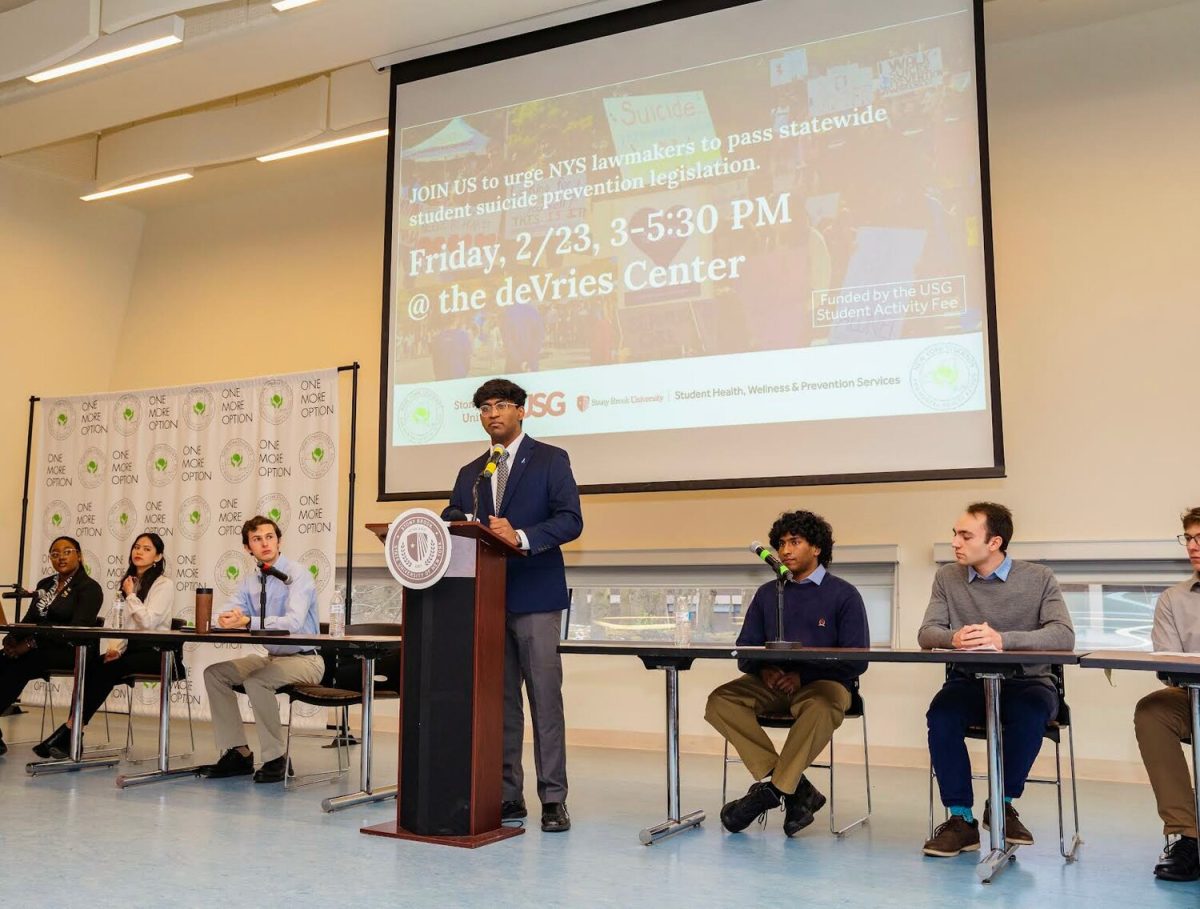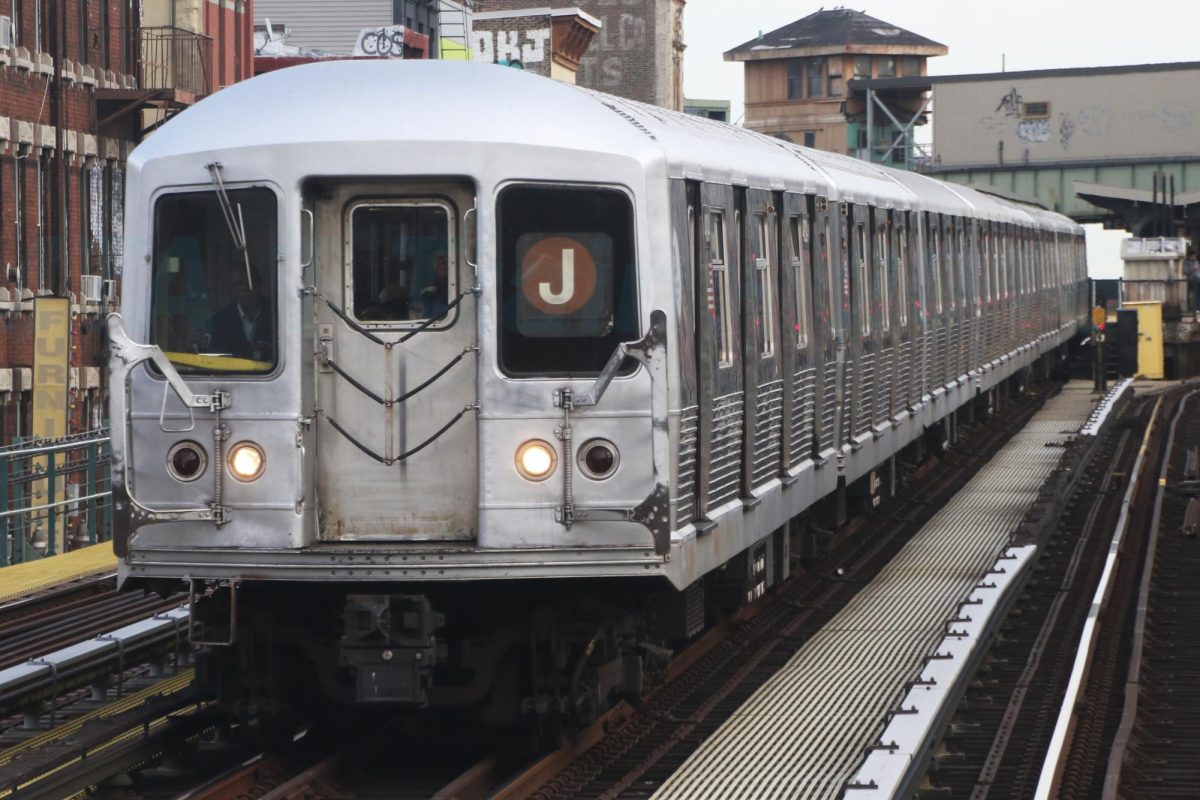The University’s Student Government Association has joined a growing coalition of college student governments in New York calling on state lawmakers to enact a collegiate student suicide prevention law. Such a law would establish mandates for colleges and universities in New York State to adopt comprehensive suicide prevention, intervention and postvention policies. The policies proposed include bolstering universities’ emergency response plans to raise awareness of risk factors and warning signs, formalizing emergency contact notification protocols and requiring assessments of campus environments for dangerous spaces conducive to suicide attempts. The proposed measures would also train and equip a wider array of universities’ on-campus staff to assist students expressing suicidal ideation.
The initiative was launched in September 2023 by SUNY Stony Brook undergraduate student Vignesh Subramanian (‘24), who drafted the proposals. After sponsoring a resolution approved by his university’s undergraduate student government declaring support for the cause, Subramanian began reaching out to college student government leaders across downstate New York to request their support. These governments approved sister support resolutions of their own, lending support for the initiative and coordinating advocacy efforts under the newly formed New York Students for Mental Health Action (NYSMHA) Coalition, which Subramanian leads.
Over the six months that have passed since its inception, the NYSMHA Coalition has grown to include over 50 college student governments statewide. The student governments’ home institutions range from CUNYs and SUNYs to private universities, and their elected leaders collectively represent over 600,000 New York college and university students. On March 21, the University’s New York City campus Student Government Association (SGA) became the latest to join the coalition and express support for the initiative, with Executive President Aman Islam signing the SGA-backed resolution.
“The state needs to do more to support students at universities unprepared to meet their needs,” said Islam. “The Legislature’s overall failure to act on this issue has been disappointing, and as student leaders, we’re urging lawmakers to take action to prevent more suicides. This is not a controversial issue.”
Unlike at least 21 other states, New York does not currently have a law requiring higher education institutions to adopt suicide prevention policies specified by statute or to retain mental health professionals specifically trained in suicide intervention protocols. An active state bill titled the “Student Suicide Prevention Act”, or SSPA (bill number S1537) has been proposed to require schools to adopt suicide prevention and intervention policies, but would only apply to K-12 schools as currently written. NYSMHA coalition leaders have responded by urging the SSPA’s sponsors to amend the bill to include colleges and universities under its mandates.
The coalition’s leaders report widespread support for the proposals among the student populations of their respective campuses, with many responding positively to social media posts and public statements released upon the passage of their resolutions. Students at the University and beyond argue that college is stressful, time-consuming and challenging – and that college students reserve the right to be able to confer with adequately trained staff to prevent their mental health struggles from spiraling into self-harm.
“It’s pretty clear there is broad-based consensus on these reforms,” said Subramanian. “Our partner advocates, from the AFSP [American Foundation for Suicide Prevention] to the JED Foundation, are solidly behind our proposals, and we’ve received supportive responses from student communities, counseling office directors and university administrators alike. Universities need guidance on how to reach those most at risk. The state must act to provide it.”
The process of amending and advancing the SSPA, however, has reportedly been a painfully difficult one. On Jan. 5, student leaders from several New York City-area CUNYs and private universities, led by Subramanian, met with SSPA Senate sponsor Sen. Brad Hoylman-Sigal to propose the reforms. According to Subramanian, the student leaders had some initial success in their negotiations, as the proposed language additions received immediate support from the Senator and his team. However, the process also required the endorsement of the SSPA’s counterpart Assembly sponsor, Assemblyman Daniel O’Donnell. The coalition reached out to his office the week after the Hoylman-Sigal meeting and Assm. O’Donnell’s legislative staff initially assured Subramanian and other leaders that the language was being reviewed and that they supported its general tenets. However, O’Donnell and his team then reportedly proceeded to ignore requests for updates from Sen. Hoylman-Sigal’s office and NYSMHA from early January until mid-February, at which point the Assemblymember’s staff abruptly informed the Senator’s team that they had no interest in amending the legislation.
The over five-week delay stunned coalition leaders, as it evidently cost valuable time amid the state’s ongoing legislative session. The session spans from January to June, and bills must pass by June 6 to be enacted into law this year. Waiting five weeks to decline considering the proposed amendments to the bill appeared to nearly derail the initiative altogether – and Assm. O’Donnell is being widely criticized for his refusal to engage with student representatives, with other student-run newspapers highlighting his lack of comment on the situation. In addition to failing to provide a clear rationale for their rejection of the proposals, Assm. O’Donnell’s office did not convey the declination directly to student leaders, instead opting to converse only with members of Sen. Hoylman-Sigal’s staff. In coalition leaders’ view, Assm. O’Donnell blatantly disregarded the requests of student leaders representing the interests of thousands of at-risk students across the state, including many residing on and attending campuses within his own district, who counted on him to address their needs alongside those of younger students.
“The refusal to consider the proposals on their merits was incredibly disheartening,” Subramanian told the Press. “The coalition made exhaustive efforts to communicate with his office, all of which were ignored, so we’re going public with the nature of those discussions. We want to work with you – but if you won’t meet us halfway, at least step aside. There is too much at stake for us to be distracted by obfuscation of the process.”
Despite the setback, coalition leaders remain optimistic action can be taken on collegiate student suicide prevention legislation this session. The NYSMHA coalition is now proposing a standalone bill, titled the “College Student Suicide Prevention Act” (CSSPA), that focuses solely on curbing suicides among college and university students. Modeled closely on the original SSPA in its structure, but on other laws passed by states like New Jersey in its contents, the CSSPA would create a new article in New York’s state education law focused explicitly on collegiate student suicide prevention. The coalition believes this bill will set a uniform standard for higher education institutions to update and strengthen their suicide prevention and intervention plans by including the policies as mentioned above.
A significant portion of the bill is dedicated to requiring universities to have all residential assistants and staff, academic advisors and campus security complete “Question, Persuade, Refer” (QPR) gatekeeper suicide prevention training, which Pace does not currently require but which is already fully funded by the state. The measure would significantly expand students’ access to trained personnel in close proximity in the event of a suicidal crisis. Universities would also be required to develop partnerships with community providers and culturally competent outreach strategies for students who are off-campus or don’t substantially benefit from on-campus services. Finally, the new bill includes provisions requiring universities to revise their leave-of-absence policies, so that a student expressing suicidal ideation is no longer forced to involuntarily withdraw from enrollment solely on that basis if that practice was permitted by pre-existing university policy. Overall, these measures are aimed at helping students in need become comfortable in discussing their mental health struggles with informed peers and staff, especially in a crisis. Amid the growing youth mental health crisis across the state and nationwide, coalition leaders believe these steps are critical for higher education institutions to receive the state-level guidance they need to reinforce their preparedness frameworks.
Senator Lea Webb, a member of the Senate Higher Education Committee, has expressed interest in sponsoring the bill. On the Assembly side of the Legislature, the staff of Assemblymember Pat Fahy, Chair of the Assembly Higher Education Committee, have signaled that she will likely sponsor the bill in her chamber. Over two dozen lawmakers on both sides of the aisle and in both chambers of the Legislature, who had expressed support for the initial strategy of amending the SSPA, are now shifting their support to this new bill, which is set to be introduced once the state’s budget talks wind down. NYSMHA leaders are hopeful the enactment of this legislation would significantly reduce the obstacles students face in accessing crisis resources and support while having suicidal thoughts, and these student advocates, including those of the University’s student government, are pressing on with their fight for change.








